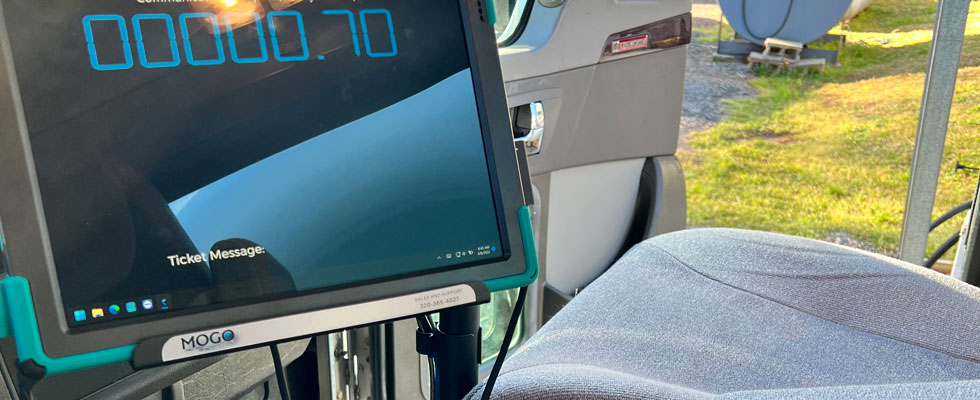
I often wonder how much more time I would have had 10 years ago if I had the technology we have today. Ten years doesn’t really seem like that long ago, but it can be hard to wrap your mind around how much technology has changed. Let me help with that. Let’s examine this in reference to truck technology.
A decade ago, drivers didn’t depend on a truck solution. They were doing what they had been doing for the last 50 years: stop, pump, stamp, write and drive to the next location. I can remember when Rural Computer Consultants (RCC) was approached with the concept of adding a truck solution to our software. As exciting as it all seemed, we were a little nervous about it. How would drivers react? Back-office software can do a lot for companies inside the office, but what could we really do to help the drivers? I imagine any software company out there that is now supplying a solution asked themselves that same question.
Giving companies technology on the road has opened so many avenues for them. For example, speeding up the delivery process, providing customer information at drivers’ fingertips, tracking drivers’ productivity and so much more. However, making them feel comfortable enough to trust this new technology has proven to be a bigger challenge.
Drivers are no longer handwriting tickets with prices, taxes, terms, contracted gallons, etc. Everything is calculated from the mobile device, allowing drivers to do what they are hired to do, and that is to pump gas and build relationships with their customers. If we increase the speed per delivery and decrease the human error in manual calculations, this only creates a higher efficiency. This also gets drivers home earlier to be with their families and can reduce costs for the propane company due to late deliveries.
RCC has heard firsthand how drivers are thanking their managers for allowing them to be home with their families because of optimized delivery loads and technology in the trucks that make their jobs more efficient. It’s great to hear the stories that come from drivers when you pair a handheld with a mapping solution.
Using truck technology allows the mobile device to communicate directly with the register. RCC uses MOGO (Mobile Office on the GO) to grab the totalizer readings, so drivers are not having to key in the gallons pumped. By doing this, the mobile device will calculate on the invoice as well as reconcile how many gallons were pumped versus invoiced, which is a key feature in keeping employees honest. This can be a subject no one wants to talk about, but having a truck solution that captures totalizer readings, times and locations of the pump can exponentially decrease the ability for anyone to pilfer. A mobile device can also help troubleshoot the register by letting the driver know why it’s not pumping. If the mobile device is already talking to the register, then why not let the register talk to the mobile device?
Mobile devices give the drivers information at their fingertips. A decade ago, drivers had to call the office to check for addresses, phone numbers, gate codes, location of tanks and so on. Being on the phone with drivers prevents office staff from taking calls from customers. Think about what you would do if someone took your cell phone away from you. Would you know your own sibling’s phone number? This is how dependent we are on technology.
It’s important for a dispatcher and driver to be in constant communication. It’s a common request from dispatchers to know the location of their drivers. Before mobile solutions, they would be sitting in the office taking a call from a customer that needed a fill. The dispatcher would have to call the drivers to see where they were or remember who was on what route.
With technology in the trucks, they can see where the drivers are throughout the day. With some real-time communications software, dispatchers can see where the drivers are on the map and which driver is closest to the location of the caller.
It’s no secret that drivers on call love having technology in their trucks. Think back to when a driver would get a call from a customer at night or on a weekend. It was impossible for that driver to know every detail about each customer. Do they owe money? How aged are their balances? When was the last delivery? When was the last payment made? The driver would have to contact someone just to get the information needed to make a delivery. This is no longer a problem with mobile devices in trucks, as this is just some of the information drivers can now access directly.
It comes down to convenience, and companies are seeing these benefits firsthand with their mobile devices. RCC has found over the last few years that having a truck solution has proven to be beneficial for more than just drivers. We keep hearing that companies are getting attacked by ransomware. We know that, too often, companies trust that data backups are there if they need them, but unfortunately this is not always the case. We’ve had companies that had to restore using a six-month-old backup.
Without a truck solution with all the batches backed up on a server, they might have lost changes made to customers’ accounts, locations and prices. Instead they had backup of all the sales and payments that were done with their truck solution. You really don’t expect an attack to happen to you until it’s too late; having a truck solution tied into your data gives you one more option if you find yourself going through this.
Having access to your information is vital to continue forward after an attack, but have you thought about what you would do during the attack? The world keeps moving, and if this were to happen during winter, customers would still need access to gas.
When companies affected by ransomware attacks are in the middle of dealing with restoring their data and their servers are down, office staff are still getting calls and can use their tablets to look up customer information. This was a big discussion at a recent National Propane Gas Association (NPGA) Benchmarking Council Meeting: What do we do if we lose internet or power? A backup option is something that companies should have these days with all the attacks that are happening.
Whether you are talking about phones, computers, apps or mobile solutions, this new technology can be scary. The phrase, “it’s hard to teach old dogs new tricks,” is often spoken when introducing this new technology. Drivers who have been delivering propane by handwriting tickets for more than 30 years can find this new technology to be daunting.
Though in RCC’s experience, after a few months of seeing firsthand how a truck solution can change how they do their jobs, these drivers are the first to say, “You can have this device back when I am dead.” They can see how user friendly a mobile solution can be and how it can truly make them more efficient.
Over the last few years dealing with COVID-19, it’s hard not to wonder where we would have been without technology. It became even more vital to keep your business running despite all the uncertainties. COVID-19 is still happening, and as companies are now struggling to find qualified help, we’ve found a key component to efficiency is having turn-by-turn directions on a mobile device. You can now hire new drivers and they can feel comfortable taking on a new job knowing they have in their hands the means to get to the next delivery location.
The training and onboarding time for new hires has drastically decreased with the implementation of intuitive truck solutions. This is an important topic in today’s market and with the ever-changing age of drivers. We no longer depend on drivers knowing every customer on their route in order to be a contributing employee.
One final trend we have seen from over the last 10 years and how having a truck solution has helped shape the future of delivering is having a routing and optimizing software that is paired up with the truck’s technology. The driver is out making the delivery, but how was that order put together? Are we hitting an optimal drop size? Are we delivering on time? Am I passing another driver? Having this piece in the back office only helps with the stress of the questions listed above.
We are in a new era of technology. We must jump into the wave of new advances or be swept away by it. Contact your software provider and ask them about technology inside and outside of the trucks to help guide your company through your next heating season.


